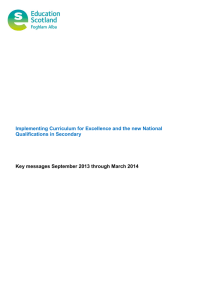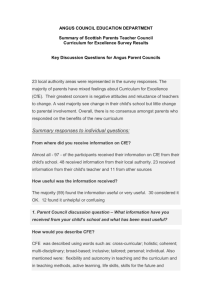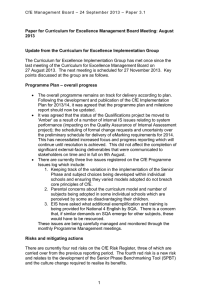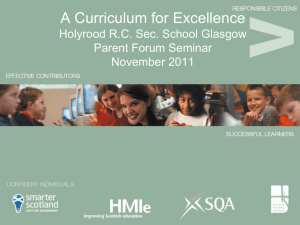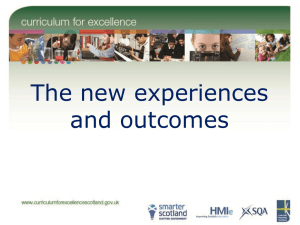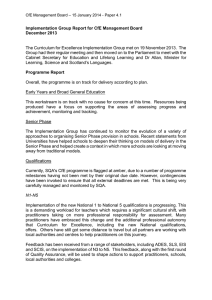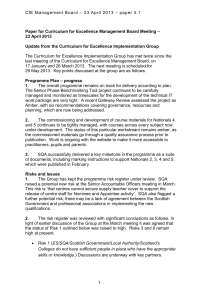CfE Leadership events: Senior Phase
advertisement
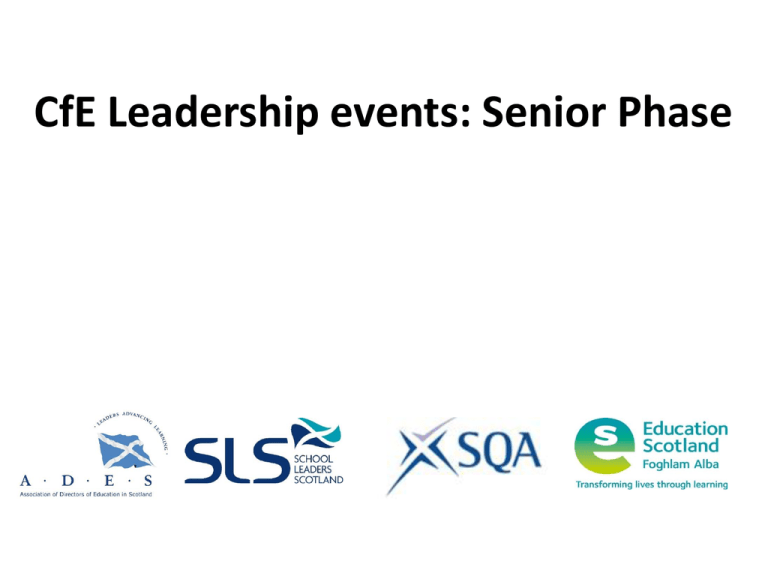
CfE Leadership events: Senior Phase Our shared agenda moving forward includes: • considering how the curriculum will continue to evolve and how approaches to learning and teaching are evolving with it; • sharing understanding of the senior phase, including examples of emerging practice identified through inspection and other evidence; • highlighting what is different about the curriculum and assessment in the senior phase of CfE; • identifying what we have learned about implementing the new qualifications; • building the confidence of parents; Our shared agenda moving forward includes: • highlighting emerging issues, including avoiding excessive bureaucracy; and • identifying areas that require further support and what that support needs to look like in order to ensure improvements in the leadership of CfE and the senior phase of CfE Today we will focus specifically on: • How we can make the most of the opportunities the senior phase offers • Taking stock on where we have got to so far with CfE and what we need to do next; and • Assessment and qualifications Session One: Graeme Logan Education Scotland Gill Stewart SQA 9.40-10.10am CfE Leadership Events: Senior Phase Graeme Logan Strategic Director Education Scotland Transforming lives through learning Additional support package • ‘Routemaps’ provide a sequenced list of key guidelines www.educationscotland.gov.uk/nationalqualificatio ns/routemaps/index.asp Transforming lives through learning Additional support package • ‘Routemaps’ provide a sequenced list of key guidelines • Important for teachers and schools to decide how to use the time, based on your own self-evaluation • New ‘key curriculum support’ website Transforming lives through learning What are we learning about leadership of the secondary school curriculum, learning, teaching & assessment? Evidence of impact of CfE….. Since September 2011, in almost all schools inspected (90%), one or more aspects of children’s/young people’s positive attributes (e.g. confidence, ambition, motivation) and/or learning experiences are reported as a key strength Transforming lives through learning A quick look back… NQs Schools of Ambition D2S Intermediate 1/2 Higher Still 5-14 10-14 TVEI Standard Grades Revised H Alt H’ Grade Alt O’ Grade O’ Grade Secondary stages and CfE • Best not to think of senior phase in isolation from 3-15 phase – part of a planned progression • Main distinctive features – senior phase is when young people capture their learning in qualifications and make the transition beyond school to positive, sustained destinations Senior Phase entitlements • Specialisation, depth and rigour • Preparation to reach highest level of Qualifications of which they are able • Development of skills for learning, life and work • Activities designed to develop the 4 capacities • Support to achieve a positive, sustained destination delivered through.... • Subject courses and qualifications • Ethos and life of the school/university/college as a community • Opportunities for personal achievement • Inter-disciplinary learning Good Senior Phase design plans for all of these as an integrated package Attributes and capabilities of a young person by the end of their BGE…. • It is wise to think about what are our expectations of the learner by the end of their BGE phase? What has the work of the school helped the young person achieve? Holistic overview • Planned supportive transition to a senior phase focusing on attaining and achieving as highly as possible Where are we with planning and implementing the senior phase? Evidence from field visits and inspections • Increasing number of schools with a senior phase where S4-S6 planned together • Current session still seeing a distinctive S4 in most schools with almost all young people taking qualifications at N4 or N5 in May 2014 • Most schools have a plan in place for this to evolve with young people studying for a qualification over 1 or 2 years Where are we with planning and implementing the senior phase? • Most schools have a plan in place for this to evolve with young people studying for a qualification over 1 or 2 years – avoiding a “two-term dash” to Higher – allowing for more qualifications at a higher SCQF level and grade • Most schools are considering reviewing S1-S3 to realise the full potential of 3rd and 4th curriculum level and smooth progression to the senior phase Where are we with planning and implementing the senior phase? • Increasing work with partners in including parents, CLD, community groups, etc. in evaluating and monitoring senior phase to meet the needs of all learners Scotland’s Young Workforce (Sir Ian Wood) • Priority for improving progression routes and positive destinations • Joint planning of senior phase with College and/or other partners • Securing the best blend of skills for learning, life and work for each young person • Final report – end of March 2014 Transforming lives through learning Giving young people good quality options that help them to prepare for work within increasing success; Including highly valued vocational education - rooted in CfE which engages significant industry support; So that … – Many of our young people in future will leave school with a blend of recognised vocational and academic qualifications – All employers of any significant size are actively engaged in the education and training system (ranging from career education in primary schools to degree level apprenticeships). And resulting in our level of youth unemployment falling to the levels of the best-performing European countries. Transforming lives through learning Leadership of Principal Teachers and Faculty Heads • Key role in planning courses and programmes to meet the needs of young people • Providing robust and reliable assessment of progress to inform moderation and quality assurance • Working with SLT in school to ensure courses and programmes are delivering within the school framework which in turn has a clear rationale, shared across stakeholders Leadership of Principal Teachers and Faculty Heads • Providing progression routes for those attaining at SCQF 2-3-4-5-6 etc. Tracking Your analysis and intervention to help every child make the best possible progress, based on a range of assessment evidence. Moderation: both ongoing and focused activities. Transforming lives through learning Emerging Senior Phase models S4 S5 5-8 x N3 N4 N5 S6 3-6 x N3/4 N5 H AH 5-6 x N3 N4 N5 H 5-8 x N3 N4 N5 5 x N4/5 N5/H H/AH 5-6 x N3/4 N4/5 N5/H 3-5 x N4 N5 H AH 1 and 2 year programmes N3 N4 N5 H AH ..threaded through with planned and progressive opportunities for personal achievement throughout the senior phase Keep the focus on outcomes for learners Educational outcomes for all learners are improving Inequity in educational outcomes is eradicated Public confidence in education is high Transforming lives through learning Do you target values rather than valuing targets? What are we here for if not to make a difference in difficult times? Session One: Gill Stewart SQA 9.40-10.10am Session Three Group Discussion Leadership of Learning The 3 Key Questions are: 1. What is your approach to leading change? 2. Where have you reached and where are you planning to go next? 3. How are you planning progression from BGE to the senior phase of CfE? 10.30-11.00am Session Six Leadership of Assessment and Qualifications Roddy Gillespie Head of CfE SQA 13.25-13.50 CfE Leadership Events: Senior Phase Session 6 Leadership of Assessment and Qualifications Roderic Gillespie Head of Curriculum for Excellence Qualifications Development February/March 2013 New National Qualifications - vision Build on strengths of current qualifications Maintain current high standards and credibility Maximise progression More focus on skills development More open/flexible requirements Personalisation and choice Create assessment opportunities that follow and support learning & teaching Provide refreshed & relevant content More flexible requirements and open assessments Course and unit specifications Course and unit support notes Specimen Question Papers and coursework information marking principles/instructions National 4 Added Value Unit Assessment SQA produced Unit Assessment Support Packs Subject support through implementation events, EdScot resources, subject webpages and SQA Liaison Team Philosophy of the new units • Follow the principles of Building the Curriculum 5 • Make assessment more of a natural part of learning and teaching – makes learning and assessment more meaningful – fit for purpose for the subject, level and individual learners – allows more time to prepare candidates for added value assessment • Considerable scope for tailoring, less prescriptive – no restrictions on conditions for example time, open/closed book, methods/instruments of assessment, etc • Allow teachers to use their professional judgement, subject knowledge and understanding to decide the most appropriate ways to generate evidence and assess candidates. Feedback from verification • Ensure assessments are valid and reliable • Sound understanding of National Standards − evidence being judged appropriately against requirements − some confusion over ‘depth of treatment’ and ‘volume of assessment evidence required’ • Good assessment practice − mainly SQA produced UASPs being used − some innovative centre generated assessments and use of audio/visual evidence − evidence of good internal verification/moderation − some confusion over the recording assessment decisions/results, use of ‘marks’ and assessment conditions • Further advice, exemplification and support required Assessment and qualifications issues • • • • • • • Planning and managing assessment Progression/transition from BGE Assimilating new requirements Quality assurance Communications Identifying resources Building confidence Listening and responding • Providing clarification and additional guidance where required • National CPD Events – Initially focussed on priority areas – SQA/Local Authority partnership delivery – joint events with Education Scotland • • • • • Subject based Q&As – updated monthly Publishing key messages from verification Following-up on verification activities Standardisation/exemplification material Additional support eg Course comparison and past paper questions documents • Monthly communication updates Realising the potential of the new national qualifications will help ensure successful outcomes for all young people – whichever path they choose to follow Session Nine Leadership of CfE Senior Phase Ways forward from here? 15.30-15.50 Ken Cunningham SLS 15.50hrs
